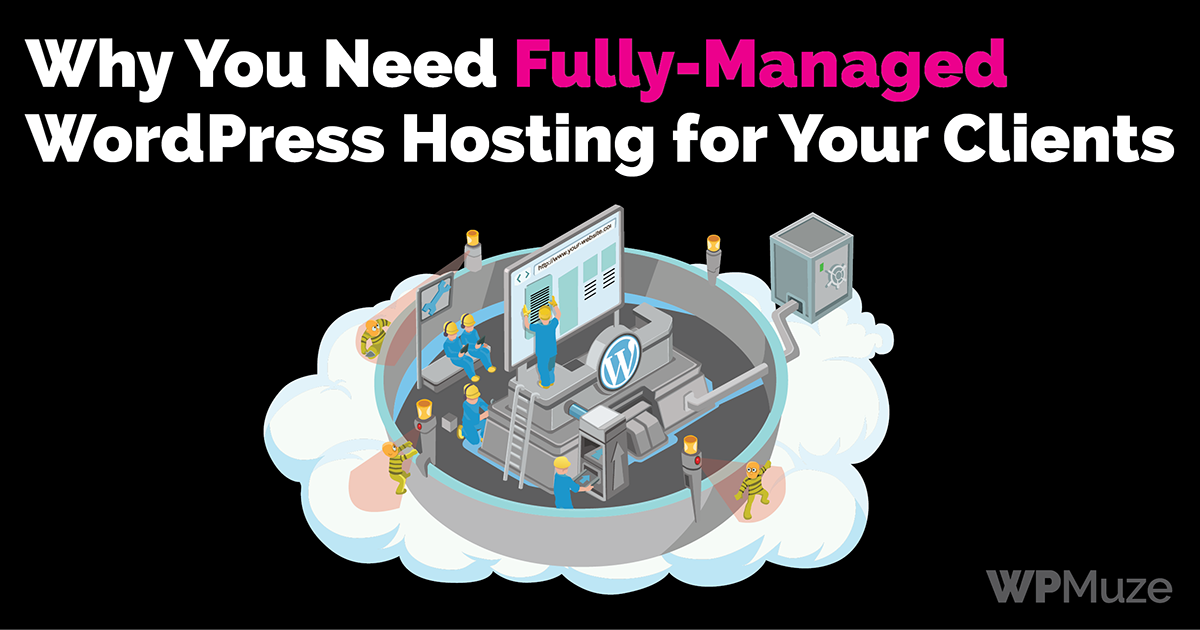Why You Need Fully-Managed WordPress Hosting for Your Clients
Do you create WordPress websites for your clients? If so, then part of your job is to ensure that your clients have a great experience with their website once it is deployed. While WordPress is one of the best content management systems to use for a wide range of applications, it is also one of the toughest to keep running optimally.
In this post, you will learn why you need fully-managed WordPress hosting for your clients to save your agency or website design business a lot of time and frustration.
Because not all backups are created equal.

One thing you will never want to experience is the pain of reconstructing your website from scratch. Clients with a lot of content (particular blog content, support documentation, or news archives) will be burdened with the process of scraping all of their content from internet archives and adding it back to their website. It’s a tedious and time consuming process.
Even with backups, a website restoration process can be tricky. This is why we store all backups off site and give your clients the assistance they need in restoring them. This will ensure minimal downtime for them, and no support time for you.
Because WordPress is the most vulnerable CMS.

WordPress hacks and malware can create a variety of issues. Some are going to be obvious, resulting in stolen websites or the entire website crashing and becoming unresponsive. Others are going to be less obvious. like having all of your client’s traffic from organic search getting redirected to another website or having their SEO information infiltrated by keywords related to the adult entertainment industry or online pharmaceutical sales.
Hackers are always on the lookout for potential exploits. And they have plenty of opportunities to find them. First, you have simple security issues created by clients using easy-to-crack passwords. When the top used passwords are 123456 and password, it’s no surprise that hackers find ways in.
Then you have to worry about vulnerabilities within the software itself (tracked on their Security archive page), from the theme frameworks, and plugins that are integrated with your client’s sites. This is why you see so many updates being released for WordPress itself, along with the theme frameworks and the plugins you use. It’s not because they are finding new features to add, but because they are finding new vulnerabilities to patch.
Even Automattic, the makers of WordPress, has had to release a critical update to patch vulnerabilities, most recently the XSS vulnerability. All it takes is one exploit to let hackers embark a world of pain into your client’s business.
This is why you need fully-managed hosting for your clients. When clients using inexpensive shared hosting services are attacked by hackers and malware, they will get little support from their hosting service. This may send them in your direction for support.
While some hacks and malware are easy to fix, others may take days to find and fix. And if you don’t find the source of the exploit in the first place, you might be cleaning the same issue again within a few days. And that’s time you could be spending creating new websites for new clients. It’s just another reason you need fully-managed WordPress hosting for your clients.
Because clients love plugins, but plugins don’t always love each other.

Unfortunately, the more plugins your client installs, the more trouble those plugins can cause for your clients – beyond just the potential security issues.
Here are just a few examples of ways that plugins can go wrong.
- Installing plugins that pull data from other websites, such as WordPress plugins that add your latest tweets to your sidebar, can cause page load issues if Twitter is experiencing downtime.
- Installing multiple social media optimization plugins may result in multiple instances of open graph code on each of your web pages. This may lead to not having the right information pulled into the link previews for your website on social media networks.
- Installing a new SEO plugin may render the SEO settings from your previous plugin or from your theme useless, meaning that all of your pages’ SEO settings will need to be updated.
- Installing certain caching plugins may cause you to be unable to see changes you’ve just made to your website. This could cause an undue amount of frustration when all you want to do is make a text change, but can’t see it.
These are only a few of the many issues I’ve seen. And it doesn’t even include the issues caused when clients want to take functionality to a whole new level and start editing their plugin files based on code they found on a forum or plugin support site.
Most hosting companies will not help with issues related to WordPress themes or plugins. That’s why we do – to help your clients when they need it to get the best functionality possible for their website.
Because one simple update can lead to the white screen of death.

If your client is unfamiliar with FTP, then they will have a tough time troubleshooting the problem, as the issue usually requires removing plugins or renaming active themes. Fortunately, this is a much easier issue to solve with complete support from managed WordPress hosting.
Because WordPress isn’t the only thing your client will have to battle.

That’s why we call it a concierge service. If your client is having an issue with their website, we will check it out for them, even if it has nothing to do with WordPress. Sometimes a small effort on our part will go a long way in solving your client’s problems, ensuring that they are satisfied with the website you created them for years to come.
Does that sound like what you want for your clients? If so, be sure to learn more about the services we offer to ensure that your web design clients remain supported beyond the deployment of their website.
